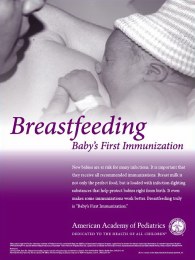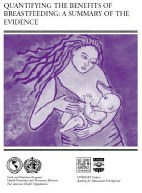 |
|
|
Benefits of Breastfeeding
|
|
xx
"Babies were Born to be Breastfed"
|
|
x
"Affordable Health Care Begins with Breastfeeding"
|
|
"Breastfeeding is a natural safety net against the worst effects of poverty. If a child survives the first month of life, the most dangerous
period of childhood, then for the next 4 months or so, exclusive breastfeeding goes a long way towards cancelling out the health
difference between being born into poverty or being born into affluence. It is almost as if breastfeeding takes the infant out of poverty for those few vital months in order to give the child a fairer start in life and compensate for the injustices of the world into which it was born."
The late James P Grant, past Executive Director of UNICEF
|
World American Cancer Institute
(includes 138 mentions of breastfeeding as
cancer prevention)
|
|
|

|
 |
BENEFITS FOR BABY
|
 Breast milk is the most complete form of nutrition for infants. A mother's milk has just the right amount of fat, sugar, water, and protein that is needed for a baby's growth and development. Most babies find it easier to digest breast milk than they do formula. Breast milk is the most complete form of nutrition for infants. A mother's milk has just the right amount of fat, sugar, water, and protein that is needed for a baby's growth and development. Most babies find it easier to digest breast milk than they do formula. As a result, breastfed infants grow exactly the way they should. They tend to gain less unnecessary weight and to be leaner. This may result in being less overweight later in life. As a result, breastfed infants grow exactly the way they should. They tend to gain less unnecessary weight and to be leaner. This may result in being less overweight later in life. Premature babies do better when breastfed compared to premature babies who are fed formula. Premature babies do better when breastfed compared to premature babies who are fed formula. Breastfed babies score slightly higher on IQ tests, especially babies who were born pre-maturely. Breastfed babies score slightly higher on IQ tests, especially babies who were born pre-maturely.
 |
BENEFITS FOR MOTHER
|
 Nursing uses up extra calories, making it easier to lose the pounds of pregnancy. It also helps the uterus to get back to its original size and lessens any bleeding a woman may have after giving birth. Nursing uses up extra calories, making it easier to lose the pounds of pregnancy. It also helps the uterus to get back to its original size and lessens any bleeding a woman may have after giving birth.  Breastfeeding, especially exclusive breastfeeding (no supplementing with formula), delays the return of normal ovulation and menstrual cycles. (However, you should still talk with your doctor or nurse about birth control choices.) Breastfeeding, especially exclusive breastfeeding (no supplementing with formula), delays the return of normal ovulation and menstrual cycles. (However, you should still talk with your doctor or nurse about birth control choices.)  Breastfeeding lowers the risk of breast and ovarian cancers, and possibly the risk of hip fractures and osteoporosis after menopause. Breastfeeding lowers the risk of breast and ovarian cancers, and possibly the risk of hip fractures and osteoporosis after menopause. Breastfeeding makes your life easier. It saves time and money. You do not have to purchase, measure, and mix formula. There are no bottles to warm in the middle of the night! Breastfeeding makes your life easier. It saves time and money. You do not have to purchase, measure, and mix formula. There are no bottles to warm in the middle of the night!  A mother can give her baby immediate satisfaction by providing her breast milk when her baby is hungry. A mother can give her baby immediate satisfaction by providing her breast milk when her baby is hungry.  Breastfeeding requires a mother to take some quiet relaxed time for herself and her baby. Breastfeeding requires a mother to take some quiet relaxed time for herself and her baby.  Breastfeeding can help a mother to bond with her baby. Physical contact is important to newborns and can help them feel more secure, warm and comforted. Breastfeeding can help a mother to bond with her baby. Physical contact is important to newborns and can help them feel more secure, warm and comforted.  Breastfeeding mothers may have increased self-confidence and feelings of closeness and bonding with their infants. Breastfeeding mothers may have increased self-confidence and feelings of closeness and bonding with their infants.
 |
BENEFITS FOR SOCIETY
|
 Breastfeeding saves on health care costs. Total medical care costs for the nation are lower for fully breastfed infants than never-breastfed infants since breastfed infants typically need fewer sick care visits, prescriptions, and hospitalizations. Breastfeeding saves on health care costs. Total medical care costs for the nation are lower for fully breastfed infants than never-breastfed infants since breastfed infants typically need fewer sick care visits, prescriptions, and hospitalizations. Breastfeeding contributes to a more productive workforce. Breastfeeding mothers miss less work, as their infants are sick less often. Employer medical costs also are lower and employee productivity is higher. Breastfeeding contributes to a more productive workforce. Breastfeeding mothers miss less work, as their infants are sick less often. Employer medical costs also are lower and employee productivity is higher. Breastfeeding is better for our environment because there is less trash and plastic waste compared to that produced by formula cans and bottle supplies. Breastfeeding is better for our environment because there is less trash and plastic waste compared to that produced by formula cans and bottle supplies. |
 |
Health Risks of Not Breastfeeding
|
Breast milk has agents called antibodies in it to help protect infants from bacteria and viruses. Recent studies show that babies who are not exclusively breastfed for 6 months are more likely to develop a wide range of infectious diseases including ear infections, diarrhea, respiratory illnesses and have more hospitalizations. Also, infants who are not breastfed have a 21% higher postneonatal infant mortality rate in the U.S.
 Some studies suggest that infants who are not breastfed have higher rates of sudden infant death syndrome (SIDS) in the first year of life, and higher rates of type 1 and type 2 diabetes, lymphoma, leukemia, Hodgkin's disease, overweight and obesity, high cholesterol and asthma. More research in these areas is needed (American Academy of Pediatrics, 2005). Some studies suggest that infants who are not breastfed have higher rates of sudden infant death syndrome (SIDS) in the first year of life, and higher rates of type 1 and type 2 diabetes, lymphoma, leukemia, Hodgkin's disease, overweight and obesity, high cholesterol and asthma. More research in these areas is needed (American Academy of Pediatrics, 2005).
 Babies who are not breastfed are sick more often and have more doctor's visits. Babies who are not breastfed are sick more often and have more doctor's visits.
Also, when you breastfeed, there are no bottles and nipples to sterilize. Unlike human milk straight from the breast, infant formula has a chance of being contaminated.
 |
Position Statements Supporting Breastfeeding
|
Breastfeeding is the physiological norm for both mothers and their children. Breastmilk offers medical and psychological benefits not available from human milk substitutes. The AAFP recommends that all babies, with rare exceptions, be breastfed and/or receive expressed human milk exclusively for the first six months of life. Breastfeeding should continue with the addition of complementary foods throughout the second half of the first year. Breastfeeding beyond the first year offers considerable benefits to both mother and child, and should continue as long as mutually desired. Family physicians should have the knowledge to promote, protect, and support breastfeeding. (1989) (2007)
 |
Organizations Supporting
Breastfeeding
|
|
 |
Publications
|
The following publications and organizations provide more information on the benefits
of breastfeeding:
Breastfeeding - This web site briefly describes the benefits of breastfeeding, what to do if you have trouble breastfeeding, and links to information from the National Institute of Child Health and Human Development about breastfeeding.
Breastfeeding and Maternal and Infant Health Outcomes in Developed Countries - This report reviews the current evidence on the effects of breastfeeding on short- and long-term infant and maternal health outcomes in developed countries. It concludes that a history of breastfeeding is associated with a reduced risk of many diseases in infants and mothers from developed countries.
Breastfeeding vs. Formula Feeding (Copyright © Kids Health) - This publication contains information on the benefits of breastfeeding, the pros and cons of bottle-feeding, instructions on how to breastfeed or bottle-feed your baby, as well as answers to common breastfeeding questions.
Feeding Your Newborn (Copyright © Kids Health) - This publication contains information on breastfeeding or bottle-feeding your baby, the advantages of breastfeeding, limitations of both, and possible challenges.
What are the Benefits of Breastfeeding my Toddler?(Copyright © La Leche League International) - This publication describes how breastfeeding your toddler can help their ability to mature and their understanding of discipline as well as provide protection from illness and allergies.
What's in Breast Milk? (Copyright © APA) - Proteins, fats and vitamins are some of the substances that make up breast milk. This publication describes the composition of breast milk and what makes it the best source of nutrition for your baby.
|

|
 © 2008-2016 Florida Breastfeeding Coalition, Inc.
This Internet site provides information of a general nature and is designed for the purpose of promoting, protecting and supporting breastfeeding.
If you have any concerns about your health or the health of your child,
you should always consult with a physician or other healthcare professional.
|
 |




